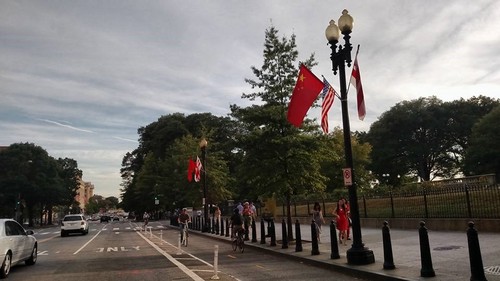On Thursday afternoon, a friend of mine who lives in Washington, DC posted a photo of a street in town with the following comment: “The Pope's plane had not even left the area before the Vatican flags came down and were replaced by Chinese flags in downtown DC today. What a place to live.”

Just hours after bidding farewell to the Pontiff, President Obama welcomed Chinese President Xi Jinping to town for a two-day state visit. It began with a working dinner at the White House on Thursday, followed by a full day of talks on Friday that began with a 21-gun salute at the White House and ended with a state dinner.
President (and Communist Party General Secretary) Xi began his US visit in Seattle on Tuesday, where he gave a speech, met with tech business leaders, played ping-pong with some high school students, and signed a deal to buy 300 Boeing airplanes.
In the run-up to and during his visit last week, there were a lot of great stories and analyses that put President Xi and the trip into context.
The New York Times has done a bang-up job of producing stories that give us a glimpse of who Xi Jinping is, and the forces and ideas that have shaped his rise to power. In this video, by Jonah Kessel, Times correspondents share their comments and observations:
This excellent piece by two of the reporters featured in the video take a look at Xi’s experiences during the Cultural Revolution and how those experiences have influenced him and helped him go from schoolboy to survivor to president.
When the pandemonium of the Cultural Revolution erupted, he was a slight, softly spoken 13-year-old who loved classical Chinese poetry. Two years later, adrift in a city torn apart by warring Red Guards, Xi Jinping had hardened into a combative street survivor.
His father, a senior Communist Party official who had been purged a few years earlier, was seized and repeatedly beaten. Student militants ransacked his family’s home, forcing them to flee, and one of his sisters died in the mayhem. Paraded before a crowd as an enemy of the revolution and denounced by his own mother, the future president of China was on the edge of being thrown into a prison for delinquent children of the party elite.
Writing for the Brookings Institute, Cheng Li cautions against a one-dimensional analysis of President Xi and what he’s up to:
A comprehensive understanding of Xi’s contradictions is instrumental for foreign observers. We should not overstate any one dimension of Xi’s leadership while ignoring others. It is still premature to make a definitive judgment about his intentions, capacity, and historical legacy. It would be a huge mistake to conclude that Xi’s policy decisions—either domestic or foreign—are predetermined.
On his first day in the US, President Xi gave a speech to more than 700 business leaders in Seattle. China File asked some of their regular contributors to give their reactions to the speech.
Taisu Zhang, a professor at Duke University School of Law, noted a continuation of the pragmatic approach of Jiang and Hu:
Tonight’s speech, however, seemed to echo the ideological stance of the Jiang and Hu eras in emphasizing economic development above all else. Does this mean that the Party leadership is feeling more optimistic about its economic prospects than outside observers seem to recognize, or is it simply acknowledging the unavoidable truth that its political fate and legacy will ultimately be determined by its economic performance?
Andrew Nathan reflected on the hope that many had when Xi came to power that he would be a political reformer:
Hope in Xi as a political reformer has faded because of the tough line his government has pursued since coming to power, expressed most recently in the arrests of over two hundred rights protection lawyers or members of their staffs. One may still hold out hope that Xi is consolidating power only to loosen it up at a later stage of his time in office. But, as the Chinese saying goes, “Listen to the words, but watch the action” 听其言观其行 (tīng qí yán guān qí xíng).
And finally, for a glimpse of what The People’s Daily wants foreigners to think that foreigners think about “Uncle Xi,” watch this.
No comment necessary!
Header image credit: VOANews
Text image credit Marc Sachs, via Facebook

Joann Pittman
Joann Pittman is Vice President of Partnership and China Engagement and editor of ZGBriefs. Prior to joining ChinaSource, Joann spent 28 years working in China, as an English teacher, language student, program director, and cross-cultural trainer for organizations and businesses engaged in China. She has also taught Chinese at the University …View Full Bio
Are you enjoying a cup of good coffee or fragrant tea while reading the latest ChinaSource post? Consider donating the cost of that “cuppa” to support our content so we can continue to serve you with the latest on Christianity in China.